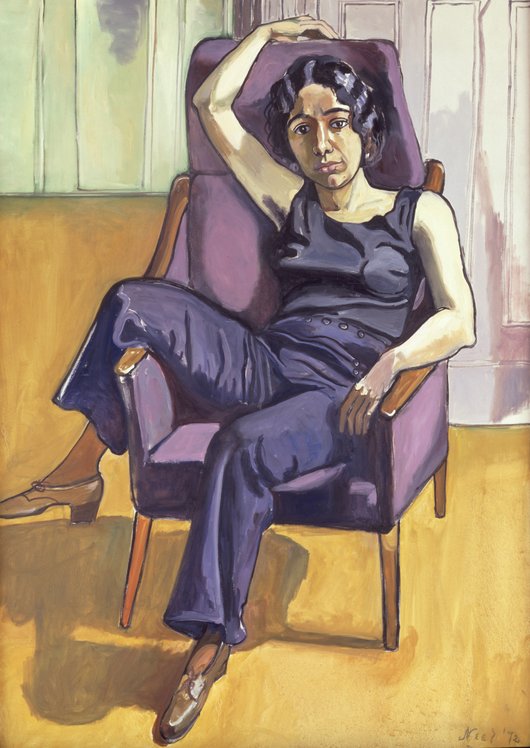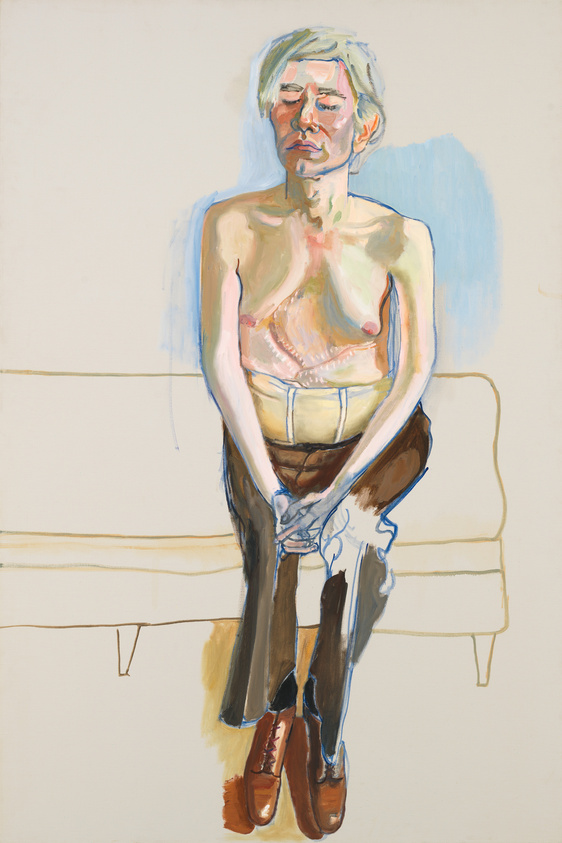Also see People Come First
Centre Pompidou –
5 October, 2022 – 16 January, 2023
Barbican Centre, London
February 16, 2023 to May 21, 2023
 Image: Alice Neel, Marxist Girl (Irene Peslikis), 1972
Image: Alice Neel, Marxist Girl (Irene Peslikis), 1972
Oil on canvas
151.8 x 106.7 cm
59 3/4 x 42 in
59 3/4 x 42 in
© The Estate of Alice Neel
Courtesy The Estate of Alice Neel and Victoria Miro
Left: Alice Neel, Ellie Poindexter, 1961. Oil on canvas, 99.7 x 66.5 cm. 39 1/4 x 26 1/4 in © The Estate of Alice Neel. Courtesy the Estate of Alice Neel and Victoria Miro. Right: Alice Neel, Ellie Poindexter, 1962. Oil on canvas, 76.2 x 61 cm. 30 x 24 1/8 in © The Estate of Alice Neel. Courtesy the Estate of Alice Neel and Victoria Miro.
This autumn, the Centre Pompidou is dedicating a major exhibition to Alice Neel
(1900-1984), an important North American artist. Born with the century, this remarkable
painter was largely overlooked during her own lifetime, but is now celebrated
for how acutely she portrayed the different levels of American society. Her vast oeuvre
has even been compared to Balzac’s La Comédie Humaine (The Human Comedy).
Six years after the retrospective held at the Van Gogh Foundation in Arles,
the exhibition, “Alice Neel – An Engaged Eye” presents the artist in a specific light,
emphasising her political and social activism, in connection to her membership
in the Communist party and involvement in the women’s rights movement.
The exhibition reflects Centre Pompidou’s commitment to furthering the study
and understanding of the work of female artists, and to featuring a greater proportion
of their works in the collection.
Throughout her life, Alice Neel painted marginalized individuals, those who were relegated
to the fringes of American society, because of their origin, skin colour, eccentricity, sexual
orientation or their radical political activism. As she became better known in the 1960s, Alice
Neel widened the spectrum of her models to include those from more privileged backgrounds,
but she always remained true to her convictions. A few weeks before her death, the painter
stated, “In politics and in life I always liked the losers, the underdogs. There was a smell
of success that I don’t like.”
Alice Neel painted a lot of women, particularly female nudes – far removed from traditional
depictions of women as objects of the male gaze – and unsentimental portrayals of pregnant
female nudes. She even went so far as to portray a victim of domestic violence. For this
she became an icon of militant feminism. Foreshadowing contemporary discussions, in 1971
she explained, “I have always believed that women should resent and refuse to accept
all the gratuitous insults that men impose upon them.”
Although she lived and worked through the heydays of triumphant abstraction, pop art,
minimalism and conceptualism, Alice Neel, a free-spirited, independent woman, pursued
her figurative painting, going against the tide of the prevalent avant-garde art scene of New
York, a city she had called home since the early 1930s. As a resident of working-class
multi-ethnic neighbourhoods – first Greenwich Village and later Spanish Harlem – Alice Neel,
a single mother who lived on welfare, felt close to her sitters with whom she sought to identify.
Her engagement was never abstract – it was shaped by real experiences. She had no interest
in painting a story without the filter of close intimacy. Like the lens of a camera, Alice Neel
brought those who had long remained in the shadows and been ignored by society into
our field of vision. This was her first political act. The second was her choice of framing
which reveals a striking frontality. The artist places us directly in front of her sitters.
With great visual power, Alice Neel imposes them on us: look at them !
The exhibition is being shown exclusively in Paris and is divided into two parts loosely
conceived, around the notions of the class struggle and the struggle for gender equality.
Each section is presented as a thematic retrospective, starting with her earliest works
in the late 1920s, which were painted in Cuba, and finishing with the final paintings made
shortly before her death in 1984. In all, some 75 paintings and drawings are on view,
along with two extracts from a film about the artist made by French artist Michel Auder -
in the late 1970’s as well as other film productions.
A selection of unpublished documents
is also included in the show.
The exhibition opens with works by two other artists : a portrait of the painter by Robert
Mapplethorpe and a work by Jenny Holzer drawn from Alice Neel’s FBI record. In October 1955,
FBI agents visited Neel to question her as she had been under investigation since 1951
for her ties to the Communist party.
The exhibition will be presented at the Barbican Centre in London from February 16, 2023
to May 21, 2023.
This exhibition was originally scheduled from June 10 to August 20, 2020.
Alice Neel, Andy Warhol, 1970
Oil and acrylic on canvas
152.4 × 101.6 cm
Whitney Museum of American Art, New York. Gift
of Timothy Collins 80.52
The Estate of Alice Neel
Photo © 2019. Digital image Whitney Museum
of American Art / Licensed by Scala
Centre Pompidou
Three questions for Angela Lampe,
the exhibition curator, curator of modern collections
at the Musée national d’art moderne,
Who is Alice Neel, the artist?
“I am the century” Alice Neel used to say. She was born on 28 January 1900 and died in 1984.
Long ignored during her lifetime, Neel currently figures among the most striking painters
of 20th century American art. Living in New York, she made innumerable portraits of all social
classes, her family – friends, lovers, neighbours, artists, poets, art critics – but also of those
whom society ignored and neglected – Latin-American and Puerto Rican immigrants, Blacks,
young delinquents whose kingdom was the street, and mothers struggling to raise
their children. As a Communist sympathiser, Neel took a lifelong interest in injustice
and inequality, lampooning racial segregation and discrimination against women
and homosexuals. Her uncompromising female nudes made her an icon of feminism. Driven
by an empathetic vision, the great intensity of her portraits is striking. With Neel,
the act of painting became a quest for truth, thus a political act.
How does the Centre Pompidou project enable us to understand her work?
The project entitled “Alice Neel. Un regard engagé” (Alice Neel. A Committed Vision) presents
the artist from a particular point of view, with a strong and radical perspective: it highlights
her political and social commitment, as evidenced by her membership of the Communist Party
and her advocacy of women’s rights. “In politics and in life, I have always liked losers,
outsiders. I didn’t like the smell of success.” the artist declared. The project is divided
into two parts, freely organised around two themes that resonate with today’s world: the class
struggle and gender equality. Each section can be seen as a thematic retrospective, beginning
with early works from the late 1920s and extending to the latest paintings made shortly before
she died in 1984.
Catalogue
What is the main theme of the exhibition catalogue?
Like the exhibition, which was initially scheduled for June 2020 and postponed until
the autumn of 2022 because of the health crisis, the catalogue is organised into two parts,
revolving on the one hand around political questions and, on the other, around the image
of women’s and men’s bodies. As well as containing four new essays and a rich iconography,
the publication is a mouthpiece for the artist herself. Many works are accompanied by Alice
Neel’s comments, collected from various sources and translated into French. An anthology
of her texts and original interviews along with an illustrated chronology complete this portrait
of a committed artist. Some comments by Jenny Holzer, author of a work on the FBI file
on Alice Neel during the period of McCarthyism, emphasise her timeliness for younger artists.




